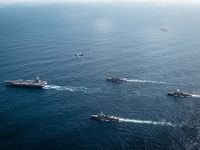The United Nations Security Council recently adopted resolution 1409(2002), implementing the Iraq Goods Review List, which changes the arrangements for UN sanctions on Iraq. While maintaining tight controls on military goods, the scheme aims to lift controls on civilian-only humanitarian goods.
“It removes Saddam's spurious excuses for the suffering he inflicts on the Iraqi people and puts more pressure on the regime. It will bring a significant reduction in UN bureaucracy to allow swifter delivery of goods to Iraq under the Oil for Food program. And it will underline once again that the Security Council has only ever had a problem with the Iraqi regime, not the Iraqi people,” a British Foreign Secretary press release read.
"We remain under no illusions that Iraq continues to pose a threat to the international community. The Goods Review List will maintain strict controls on items which might be used in Iraq's WMD or military program," it added.
A British initiative had established the Oil for Food program in 1995, while in 1999 Britain proposed the lifting of the ceiling on Iraq's oil exports. The new resolution will combine the rollover of the Oil for Food program for a further six months with the introduction of the Goods Review List (GRL).
The revised controls mean that Iraq can freely import all civilian goods, without waiting for clearance by the UN Sanctions Committee in New York. From now on, the Committee will only deal with military-related items, as defined on the GRL, in an effort to lift sanctions on civilian goods for Iraq.
While previously all exports to Iraq were prohibited, except for food, medicine and humanitarian goods, from now on everything is allowed, except for the military-related items on the GRL. Since the UN Sanctions Committee will no longer be involved in vetting civilian goods, these items will be delivered to Iraq much more quickly, without bureaucratic delay.
The system is also set to become fully transparent as the GRL is a publicly accessible UN document. The procedures attached to the resolution lay down a timetable for the processing of contracts for the export of goods to Iraq. The Sanctions Committee will not be involved in vetting contracts for civilian goods. Some examples of items, which will not now go to the Sanctions Committee but be processed without bureaucratic delay are Personal computers Normal commercial software Tractors for agricultural use X-ray equipment for airports Irrigation equipment Cars for personal use.
The new system maintains strict controls on the military-related items on the GRL, because of the Security Council's concern about their potential use in Iraq's weapons of mass destruction or military program. Items still considered by the Sanctions Committee include rocket motor cases and liquid propellants uranium and plutonium lasers detonators chemical enrichment plant systems.
The Oil for Food Program is vast. It allows Iraq to sell unlimited quantities of oil. The profits from this are deposited in the United Nations Iraq account, commonly known as the Escrow account. Iraq can then use 72 percent of these funds on almost anything other than military equipment. Even before the introduction of the GRL, Iraq could use the revenue to buy goods including food, medicine and educational, agricultural and infrastructure items.
The remainder of the revenue goes into the UN Compensation Fund (25 percent), which is recompensing those who lost their livelihoods as a result of Iraqi military aggression against Kuwait, and to pay the costs of the UN administration of the Oil for Food program and the continued UNIKOM presence (three percent).
By the beginning of May 2002, over 22,000 OFF contracts worth about $35 billion had been approved for export to Iraq. During the current phase of the program (December 2001-May 2002) $4.43 billion should be available for the humanitarian program.
In practice the Iraqi regime has not used the Oil for Food program to the full. It has consistently under-spent the amounts available in the Escrow account. While claiming that the Oil for Food program cannot meet the health needs of the Iraqi people, it has recently asked the UN to approve contracts for patently non-essential goods, e.g. two billion cigarettes, 181,000 TV sets, 500 tons of neckties.
In early May 2002, approximately $3.8 billion was lying unspent by Iraq in UN accounts.
The Iraqi Central Bank consistently holds up delivery of about one billion dollars worth of goods already approved by the UN, e.g. at present $186 million of health items and $139 million of educational supplies. — (menareport.com)
© 2002 Mena Report (www.menareport.com)







